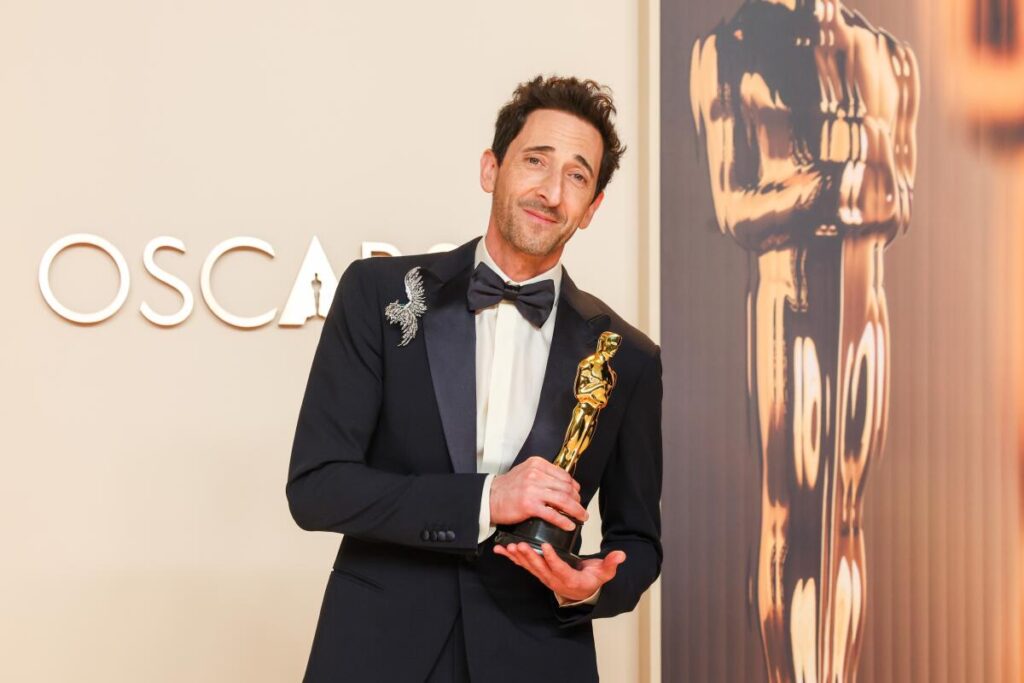On Sunday night, I settled in front of the TV with my Algebra II homework and a diet coke. I know, I know—a boisterous living room paired with a television and a can containing an obscene amount of chemicals isn’t the most conducive environment for learning, but let me tell you–I was absolutely focused on solving exponent problems.
That is, until my ears caught the voice of one of my favorite humans of all time: Conan O’Brien.
My eyes finally shot up from my worksheet. This was going to be my favorite Oscars Ceremony of all time. News flash: it wasn’t. But it was still a fairly decent ceremony (mostly because of Conan). So let’s recap some parts of the ceremony that were wholesome—and some that you could say were…A Real Pain. Hah. See what I did there?
O’Brien Never Disappoints
There’s a reason why I, and millions of others who have grown up watching him, love this guy. Conan O’Brien just has this light, chipper, aggressively enthusiastic (in a good way), and genuine persona. His contribution was very much needed after whatever that was that Jo Koy did as he stood on the Golden Globes stage for three hours. Seriously, I was starting to lose hope. However, I’ll still give Nikki Glaser a ton of credit for showing Joy Koy up at this year’s Golden Globes.
Conan starts with an opening monologue, making sure to target each and every major picture with its very own backhanded compliment (my personal favorite, directed towards Conclave: “It’s logline is: a movie about the Catholic Church, but don’t worry.”) As Time Magazine’s Judy Bergman puts it best, “No one does self-deprecation like Conan O’Brien.” O’Brien somehow manages to perfectly balance making jokes at his own expense, poking at controversial attendees (eg: Karla Sofia Gascón, star of Emilia Perez), while also maintaining an airy, eased environment. He delivers a hearty tribute to those that lost their homes and lives in the Palisades fires that ravaged L.A. earlier this year.
One of the most notable moments, though, were Conan’s words regarding the current state of…well, everything, in relation to the art of the film. “Even in the face of terrible wildfires and divisive politics, the work, which this is about, the work continues,” he says. “And next year, and for years to come, through trauma and joy, this seemingly absurd ritual is going to be here … the magic, the madness, the grandeur and joy of film worldwide is going to be with us forever.”
As somebody who has grown up appreciating film, whether that be the masterpieces that were the Barbie movies or other less-known, less masterful films such as Interstellar and Fight Club, that was a beautiful encapsulation of what it means to make art. People don’t stop making art. Not in the middle of a war, not in the middle of a fire, not in the middle of a revolution, and certainly not in the middle of an uncertain political transitioning period.
Adrien Brody Needs to Keep His Mouth Closed (And Far Away From Women)
Brody has won two Oscars over the span of his career, placing him in the same category as some of The Greats, such as Jack Nicholson and Tom Hanks. However, it seems that Mr. Brody is mostly known for A) forcefully kissing Halle Berry at the 2003 Oscars, and B) giving horribly long speeches that bore one to death. The Brutalist, directed by Brady Corbet (Thirteen, Mysterious Skin) and distributed by A24 (the same studio responsible for Anora, another major winner that night), is about a Jewish architect, László Tóth (Adrien Brody), escaping post-WWII Europe and settling in Pennsylvania. Despite receiving severe backlash for using generative AI to enhance Brody’s accent, The Brutalist was still nominated in ten categories, and won Best Actor (Brody), Best Cinematography, and Best Original Score.
However, the gag of it all wasn’t the AI-mumbo-jumbo. It was Adrien’s speech–sorry, essay–that ran for five minutes and forty seconds. When you read the transcript, you’ll think, “This isn’t even that bad.” And you’re right. It’s not the content that made the speech sort-of unbearable and Cilian Murphy looking like he wanted to die, it was the shushing of the Orchestra, and extremely slow pace.

Wrap it up, Brody. We get it—you won your first Oscar at 29 for The Pianist, and now you’ve got a second one to add to the shelf. Give your thanks and leave. Nobody wants a Roman Polanski apologist up there for that long anyways.
We Love Anora…I Think?
Do I think it’s dumb that a freshly twenty-five-year-old-woman, Mikey Madison, refused an intimacy coordinator on set for a film about a literal stripper? Yes. But do I also think that Anora was an interesting and refreshing addition to the Oscars ballot? Yes.
The first Sean Baker film I watched was The Florida Project, a film about Mooney, a young girl living with her single mother in a motel in Orlando. Baker has a way of adding a bit of “whimsy” to his work, and although Anora and The Florida Project are wildly different stories, you can see the Sean Baker touch poking through in the cinematography and lovable characters.
Anora is about a Brooklyn stripper (Mikey Madison), who “gets her chance at a Cinderella story” when she meets Zakharov (Mark Eydelshteyn), the son of a Russian oligarch. However, once word reaches Zakharov’s family in Russia, the two lovebirds’ are under threat as Zakharov’s parents storm to the US to break up the marriage.
Anora won a total of five oscars: Best Picture, Actress, Director, Original Screenplay, and Film Editing. While Madison stealing Best Actress was rather wholesome, loyal fans of The Substance (starring Demi Moore and Margaret Qualley) alleged that Moore deserved it. Ty Burr writes for the Washington Post, “What is it about the Academy’s love affair with women who sell their bodies?…The movie feels like something brand new, and it is. But, on some of the levels it’s being received, “Anora” is the same old story.”
Emilia Pérez…
Why was this film nominated, again?
Emilia Pérez is supposed to be about a lawyer (Zoe Saldana) who is hired to help a cartel-boss (Karla-Sophia) transition into a female. At face value, that sounds like an interesting film—promising even. It won two Oscars: Best Supporting Actress (Saldana), and Best Original Song (“El Mal”). I shed a tear of cringe when Camille began singing during the acceptance speech. Can you believe she sang the angelic french ballad, “Le Festin” in Ratatouille? Yeah, I can’t either.
Everything about this film is just wrong. The racist and Islamaphobic tweets from the lead, Karla Sophia, don’t make it any better. Karla wasn’t in attendance at any of the usual pre or post Oscar celebrations. Maybe that was her compromise for letting her horrible film earn some awards. Consider it a little “time-out”.

Did Oscar voters have their eyes super-glued shut when they saw the horrible dance sequences? Maybe they were wearing earmuffs when exposed to the awkward slam poetry that Zoe Saldana calls singing? I can’t fathom.
Kieran Culkin Wins for A Real Pain
No, you’re not the only one who thought that he was the little boy from Home Alone. That was actually his brother, Macaulay Culkin. Both brothers have grown up in the industry, along with their other brothers, Rory, Shane, and Christian. I first fell in love with Kieran Culkin when I saw him in Scott Pilgrim vs the World as Scott’s snarky yet lovable roommate, Wallace Wells.
Kieran won Best Supporting Actor for his role as Benji Kaplan in A Real Pain, a film about two cousins, Benji and David (Jesse Eissenberg), who tour Poland in order to honor their late grandmother. However, old tensions resurface as they explore their family history. There’s not much to say about Culkin’s win other than the fact that it was joyful. Culkin has had a phenomenal awards show season, securing a BAFTA, SAG, and Golden Globe along with his Oscar for A Real Pain alone.
Wicked: Not So Popular

Unfortunately, everyone’s favorite musical of the year (and one that was much more qualified than Emilia Pérez, at that), Wicked was not-so-popular at the Oscars this year.
Despite being nominated for a whopping ten categories, it only won in two: Best Costume Design and Best Production Design. On a more positive note, Paul Tazewell became the first black man to win in the category of Best Production Design.
No Other Land Won Best Documentary
At this point, we are all aware of the atrocities committed against innocent Gazan civilians everyday. We are not able to shield our eyes from such a harsh reality, despite many, including Hollywood, trying to do so. No Other Land winning best documentary wasn’t just a historical moment—it was, in a way, revolutionary.
Picture it this way: a documentary pieced together by an Israeli AND a Palestinian, about an alliance between a Palestinian activist, Basel, and an Israeli journalist, Yuval, showcasing the destruction on the West Bank by Israeli soldiers. America’s worst nightmare. Despite winning an Oscar, No Other Land has not yet secured US distribution. And let’s be honest, it probably won’t. Ever. I highly implore you to watch this documentary however you can.
Art has a beautiful way of showing the truth, whether that be about society or the universe itself. So even if the Oscars are just a superficial ceremony meant to be watched while sipping cola and doing your Algebra homework, it’s important to remember what the ceremony is supposed to celebrate: film.
So…what are you doing? Go watch a Barbie movie or two. Learn something.

